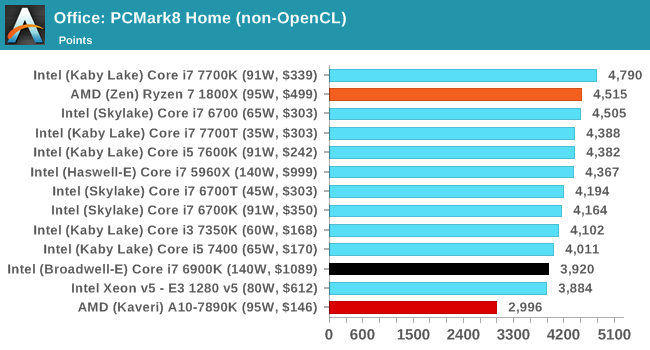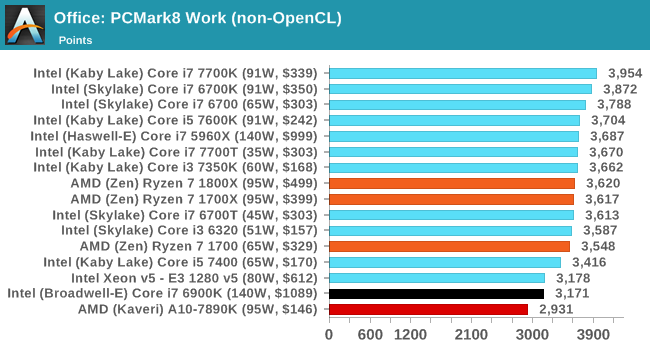The AMD Zen and Ryzen 7 Review: A Deep Dive on 1800X, 1700X and 1700
by Ian Cutress on March 2, 2017 9:00 AM ESTBenchmarking Performance: CPU Office Tests
The office programs we use for benchmarking aren't specific programs per-se, but industry standard tests that hold weight with professionals. The goal of these tests is to use an array of software and techniques that a typical office user might encounter, such as video conferencing, document editing, architectural modelling, and so on and so forth. At present we have two such tools to use.
PCMark8
Despite originally coming out in 2008/2009, Futuremark has maintained PCMark8 to remain relevant in 2017. On the scale of complicated tasks, PCMark focuses more on the low-to-mid range of professional workloads, making it a good indicator for what people consider 'office' work. We run the benchmark from the commandline in 'conventional' mode, meaning C++ over OpenCL, to remove the graphics card from the equation and focus purely on the CPU. PCMark8 offers Home, Work and Creative workloads, with some software tests shared and others unique to each benchmark set. The Creative workload unfortunately seems to fail from the commandline, as the graphical test gives an output of zero (update 3/8: we've found a way around this; will update when we get CPUs retested).


Addendum on 3/8: Originally we posted PCM8 Home scores for Ryzen that were around 3800. On further inspection, these runs were misconfigured due to circumstances beyond our control, and test data is being re-run. The Ryzen 7 1800X in this instance scores 4515.
SYSmark 2014
SYSmark is developed by Bapco, a consortium of industry CPU companies. The goal of SYSmark is to take stripped down versions of popular software, such as Photoshop and Onenote, and measure how long it takes to process certain tasks within that software. The end result is a score for each of the three segments (Office, Media, Data) as well as an overall score. Here a reference system (Core i3-4130, 4GB DRAM, 500GB HDD) is used to provide a baseline score of 1000. A newer version of the benchmark (2014 SE) will be used in future reviews.
A note on contect for these numbers. AMD left Bapco in the last two years, due to differences of opinion on how the benchmarking suites were angled towards Intel processors and had optimizations to show bigger differences than what AMD felt was present. The following benchmarks are provided as data, but the conflict of opinion between the two companies on the validity of the benchmark is provided as context for the following numbers.














574 Comments
View All Comments
FriendlyUser - Thursday, March 2, 2017 - link
True. The 1600X will be competitive with the i5 at gaming and probably much faster in anything multithreaded. The crucial point is the price... $200 would be great.MrSpadge - Thursday, March 2, 2017 - link
"Ryzen will need to drop in price. $500 1800x is still too expensive. According to this even a 7700k @ $300 -$350 is still a good choice for gamers."That's what the 1700X is for.
lilmoe - Thursday, March 2, 2017 - link
+1And for that, I'd say the 1700 (non-x) is the best consumer CPU available ATM. BUT, if someone just wants to game, I'd say get the Core i5... For me though, screw Intel. Never going them again.
fanofanand - Thursday, March 2, 2017 - link
The 1700 is the sweet spot for anyone not trying to eek out a few more fps or drop their encode/decode times by a couple of seconds. To save $170 and lose a couple hundred mhz, I know which chip seems like the best all-around for price/performance and that's the 1700.lilmoe - Thursday, March 2, 2017 - link
Yep. You get both efficiency and performance when needed. This should allow for super quiet and very performant builds. Just take a look at the idle system power draw of these chips. Super nice.Everything is going either multi-threaded or GPU accelerated, even compiling code. What I'm really waiting for is Raven Ridge. I've got lots of stock $$ and high hopes for a low power 4-6 core Zen APU, with HBM and some bonus blocks for video encode (akin to Quicksync). I have a feeling they'll be much better for idling power and have better support for Microsoft's connected standby.
khanikun - Friday, March 3, 2017 - link
i5 is a good gamer and all around cpu for majority of users. If all you plan to do is game and a tight budget, the i3 7350k is a great cpu for just that. Once the workload goes a bit more multithreaded, that's where you'll want to move to an i5.Valis - Friday, March 3, 2017 - link
I game now and then, but I do a lot of other things too. Video rendering, Crypto coins, Folding @ home, VM, etc. So any Zen, perhaps even 4 Core later thins year with a good GPU will suit me fine. :)nos024 - Thursday, March 2, 2017 - link
So the 1800x is pointless?lilmoe - Thursday, March 2, 2017 - link
I don't think pointless is the right word. I'd say it's the worse value for dollar of the three.tacitust - Thursday, March 2, 2017 - link
Not at all pointless if you do a lot of video transcoding or other CPU intensive tasks well suited to multiple cores. The price premium is still for the 1800x is way lower than the price premium for the Intel processors.